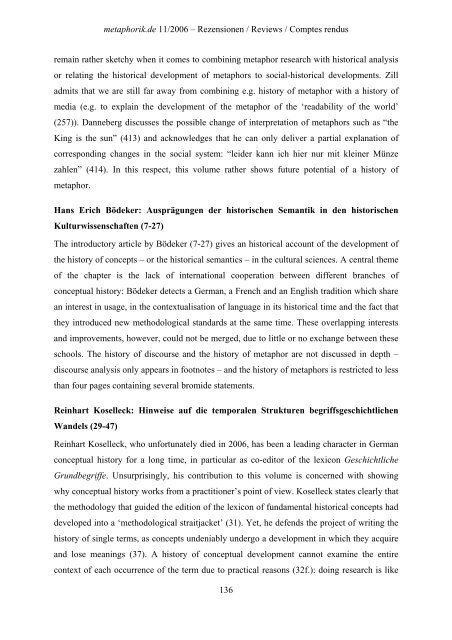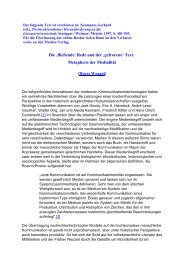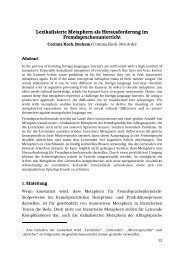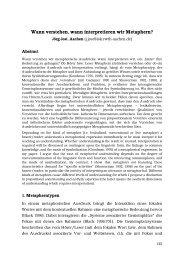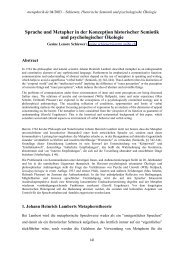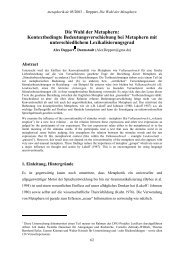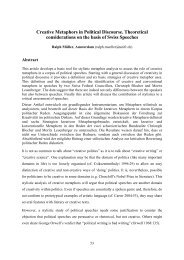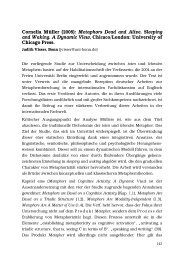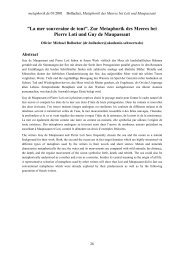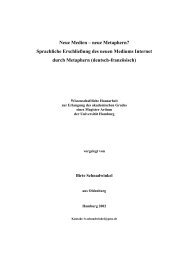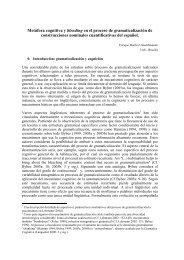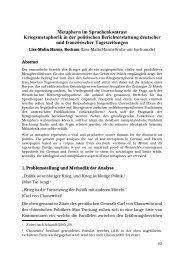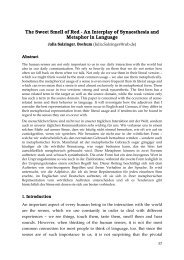Hans Erich Bödeker - metaphorik.de
Hans Erich Bödeker - metaphorik.de
Hans Erich Bödeker - metaphorik.de
You also want an ePaper? Increase the reach of your titles
YUMPU automatically turns print PDFs into web optimized ePapers that Google loves.
<strong>metaphorik</strong>.<strong>de</strong> 11/2006 – Rezensionen / Reviews / Comptes rendus<br />
remain rather sketchy when it comes to combining metaphor research with historical analysis<br />
or relating the historical <strong>de</strong>velopment of metaphors to social-historical <strong>de</strong>velopments. Zill<br />
admits that we are still far away from combining e.g. history of metaphor with a history of<br />
media (e.g. to explain the <strong>de</strong>velopment of the metaphor of the ‘readability of the world’<br />
(257)). Danneberg discusses the possible change of interpretation of metaphors such as “the<br />
King is the sun” (413) and acknowledges that he can only <strong>de</strong>liver a partial explanation of<br />
corresponding changes in the social system: “lei<strong>de</strong>r kann ich hier nur mit kleiner Münze<br />
zahlen” (414). In this respect, this volume rather shows future potential of a history of<br />
metaphor.<br />
<strong>Hans</strong> <strong>Erich</strong> <strong>Bö<strong>de</strong>ker</strong>: Ausprägungen <strong>de</strong>r historischen Semantik in <strong>de</strong>n historischen<br />
Kulturwissenschaften (7-27)<br />
The introductory article by <strong>Bö<strong>de</strong>ker</strong> (7-27) gives an historical account of the <strong>de</strong>velopment of<br />
the history of concepts – or the historical semantics – in the cultural sciences. A central theme<br />
of the chapter is the lack of international cooperation between different branches of<br />
conceptual history: <strong>Bö<strong>de</strong>ker</strong> <strong>de</strong>tects a German, a French and an English tradition which share<br />
an interest in usage, in the contextualisation of language in its historical time and the fact that<br />
they introduced new methodological standards at the same time. These overlapping interests<br />
and improvements, however, could not be merged, due to little or no exchange between these<br />
schools. The history of discourse and the history of metaphor are not discussed in <strong>de</strong>pth –<br />
discourse analysis only appears in footnotes – and the history of metaphors is restricted to less<br />
than four pages containing several bromi<strong>de</strong> statements.<br />
Reinhart Koselleck: Hinweise auf die temporalen Strukturen begriffsgeschichtlichen<br />
Wan<strong>de</strong>ls (29-47)<br />
Reinhart Koselleck, who unfortunately died in 2006, has been a leading character in German<br />
conceptual history for a long time, in particular as co-editor of the lexicon Geschichtliche<br />
Grundbegriffe. Unsurprisingly, his contribution to this volume is concerned with showing<br />
why conceptual history works from a practitioner’s point of view. Koselleck states clearly that<br />
the methodology that gui<strong>de</strong>d the edition of the lexicon of fundamental historical concepts had<br />
<strong>de</strong>veloped into a ‘methodological straitjacket’ (31). Yet, he <strong>de</strong>fends the project of writing the<br />
history of single terms, as concepts un<strong>de</strong>niably un<strong>de</strong>rgo a <strong>de</strong>velopment in which they acquire<br />
and lose meanings (37). A history of conceptual <strong>de</strong>velopment cannot examine the entire<br />
context of each occurrence of the term due to practical reasons (32f.): doing research is like<br />
136


